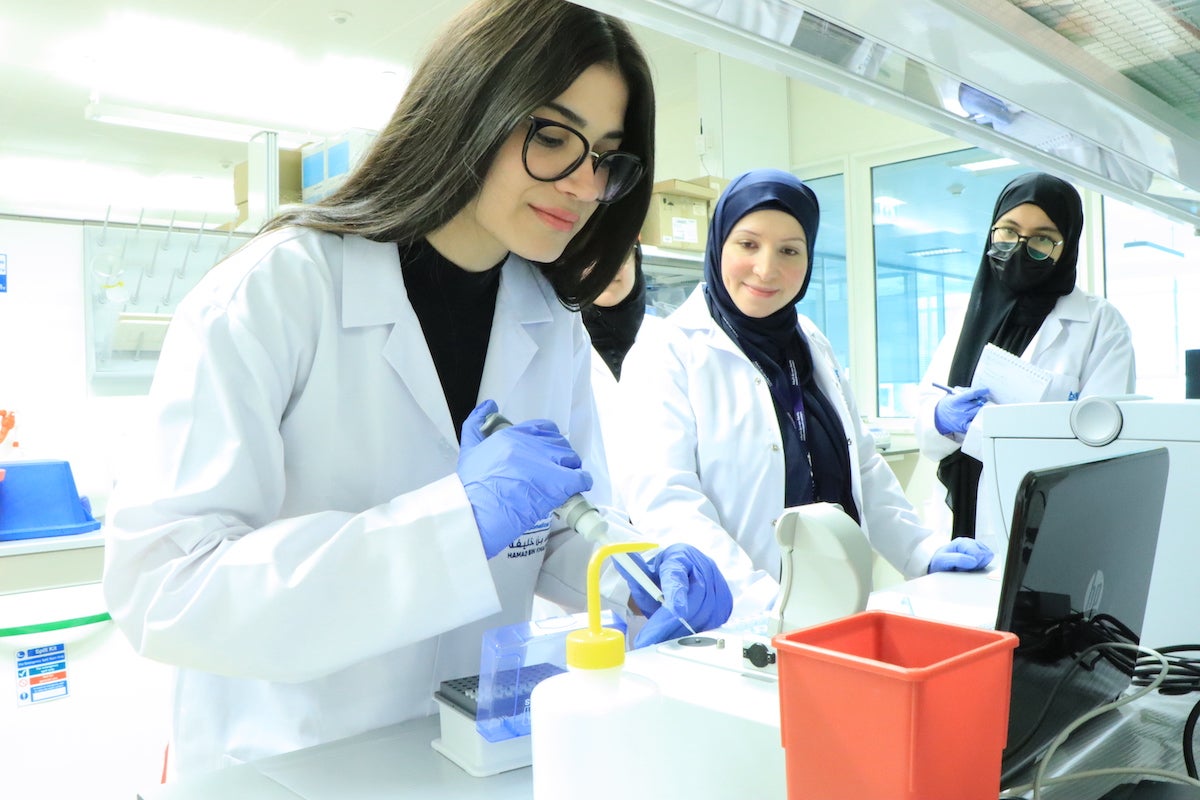
Most people who contract COVID-19 are asymptomatic or have mild symptoms and can recover at home by getting enough rest, staying well hydrated, and taking medications that relieve fever, aches, and pains.
However, the management of more severe forms of COVID-19 can be challenging. The early course of the infection, which is primarily driven by replication of the virus, is anticipated to be managed by antiviral therapies while the later course of infection, driven by an exaggerated immune/inflammatory response of the virus, may be managed by immunosuppressive/anti-inflammatory therapies.
A year since the start of the COVID-19 pandemic, the spectrum of treatment recommendations, a majority of which are repurposed drugs, is constantly broadening with numerous ongoing clinical trials. In this edition of QBRI Insights, QBRI experts discuss the most recent COVID-19 treatment recommendations (Table 1).
Antiviral drugs
In October 2020, the Food and Drug Administration (FDA) approved the antiviral drug Remdesivir to treat certain patients hospitalized with COVID-19. Clinical trials have shown that, in these patients, Remdesivir may modestly speed up recovery time (1). It is recommended for use in hospitalized patients who require supplemental oxygen, but not in patients who require mechanical ventilation due to the lack of data showing benefits at this advanced stage of the disease.
Antiviral drugs target the specific part of a virus’ life cycle that is necessary for it to reproduce (2, 3). Since viruses are highly adaptive and because they reproduce so rapidly, they have plenty of opportunities to mutate (change their genetic information) with each new generation, potentially developing resistance to antiviral drugs.
Monoclonal antibodies
In November 2020, the FDA granted Emergency Use Authorization (EUA) to two monoclonal antibody treatments (Bamlanivimab, made by Eli Lilly, and a combination of Casirivimab and Imdevimab, made by Regeneron) for outpatients who are at high risk of disease progression.
These treatments are effective in the earlier stages of infection before the host has mounted a strong immune response. Preliminary data suggests that outpatients may benefit from receiving anti-SARS-CoV-2 monoclonal antibodies early in the course of infection (4,5). The clinical data from the different trials has not yet been published.
Dexamethasone and other corticosteroids
Dexamethasone and other corticosteroids (prednisone, methylprednisolone) are potent anti-inflammatory drugs. These drugs are effective for patients who have developed a hyper-immune response (a cytokine storm) to the viral infection (6). In these cases, it is the immune system’s overreaction that is damaging the lungs and other organs, often leading to death.
A recent report on a clinical trial showed that the corticosteroid drug dexamethasone decreased mortality in very ill hospitalized COVID-19 patients and has been found to improve survival in hospitalized patients who require supplemental oxygen; it is particularly effective in patients who require mechanical ventilation (7). Therefore, the use of dexamethasone is strongly recommended in this setting but other corticosteroids such as prednisone, methylprednisolone, or hydrocortisone may be used if dexamethasone is not available. These drugs are readily available and inexpensive.
Convalescent plasma
Convalescent plasma containing antibodies from a recovered patient is given by transfusion to a patient suffering from COVID-19. The FDA has issued an Emergency Use Authorization (EUA) even though not much is known about how effective convalescent plasma is for treating COVID-19 (8). In theory, the donor antibodies may help the patient fight the illness, possibly shortening the length or reducing the severity of the disease. Since hospitalized patients with COVID-19 may already have SARS-CoV-2 neutralizing antibody titers that are comparable to those of plasma donors or have autoantibodies that may increase the severity of the disease instead, screening guidelines are necessary to identify patients that may benefit from convalescent plasma therapy (9). Several randomized, placebo-controlled trials of COVID-19 convalescent plasma are ongoing.
Chloroquine or hydroxychloroquine with or without azithromycin
Anti-malarial agents, chloroquine and hydroxychloroquine, with or without an antibiotic, azithromycin, have been studied in multiple clinical trials for the treatment of COVID-19 because of the immunomodulatory effects of both chloroquine and hydroxychloroquine (10,11). These agents did not reduce respiratory tract viral loads or demonstrate clinical efficacy in pre-clinical primate models (12). In addition, the data from randomized trials as well as large retrospective observational studies does not consistently show evidence of benefit for hydroxychloroquine with or without azithromycin in hospitalized patients with COVID-19 (13,14).
Cytokine inhibitors
Patients with severe disease manifest immune system dysregulation, inducing several pro-inflammatory cytokines and chemokines, and this cytokine storm is responsible for the multi-organ failure observed in patients with severe COVID-19. Immunomodulatory therapy targeting interleukin (IL)-6 using IL-6-receptor blockade with the humanized monoclonal antibody Tocilizumab has been used in severe cases of COVID-19. This treatment has been shown to reduce the risk of ventilation in hospitalized COVID-19 cases (15). In contrast to this, a clinical study from Italy revealed that patients with severe COVID-19 did not significantly differ in terms of clinical improvement and prognosis 28 days after receiving Tocilizumab (16).
Combination treatments
The FDA recently approved Baricitinib in combination with Remdesivir in hospitalized COVID-19 patients on mechanical ventilators or those who need supplemental oxygen. Based on a randomized, double-blind, placebo-controlled clinical trial (ACTT-2), which was conducted by the National Institute of Allergy and Infectious Diseases (NIAID), the odds of clinical improvement, overall survival as well as recovery rate was slightly improved in this group when compared to monotherapy with Remdesivir alone. Baricitinib (brand name Olumiant) is a Janus kinase (JAK) inhibitor and is FDA approved for the treatment of moderate to severe rheumatoid arthritis to help to control inflammation. A combination of Remdesivir and dexamethasone are also considered effective for the treatment of patients with severe COVID-19. In addition, ongoing studies are testing the combined efficacy of Remdesivir, dexamethasone, and Tocilizumab (RDT) in patients with severe COVID-19 (17).
Table 1. Summary of COVID-19 treatment recommendations
| Treatment | FDA Approved | Disease Severity | Published Studies | |
|---|---|---|---|---|
|
Remdesivir |
Yes |
Mild to Moderate |
Yes |
|
|
Bamlanivimab Monoclonal Antibody |
Yes |
Mild to Moderate |
Ongoing studies |
|
|
Casirivimab and Imdevimab Monoclonal Antibodies |
Yes |
Mild to Moderate |
Ongoing studies |
|
|
Dexamethasone |
Yes |
Severe |
Yes |
|
|
Convalescent Plasma |
Yes |
Severe |
Yes |
|
|
Chloroquine or hydroxychloroquine |
No |
Mild to Severe |
Yes |
|
|
Tocilizumab |
No |
Severe |
Yes |
|
|
Baricitinib plus Remdesivir |
Yes |
Severe |
Ongoing studies |
|
|
Dexamethasone plus Remdesivir |
No |
Severe |
Ongoing studies |
|
|
Dexamethasone plus Remdesivir plus Tocilizumab |
No |
Severe |
Yes |
|
Section Contributors:
Dr. Remy Thomas
Arabic text validation: Rowaida Taha (Associate Researcher, QBRI)
Editors: Dr. Adviti Naik (Postdoctoral Researcher, QBRI), Dr. Alexandra E. Butler (Principal Investigator, QBRI)
For references, please click here.
Related News










